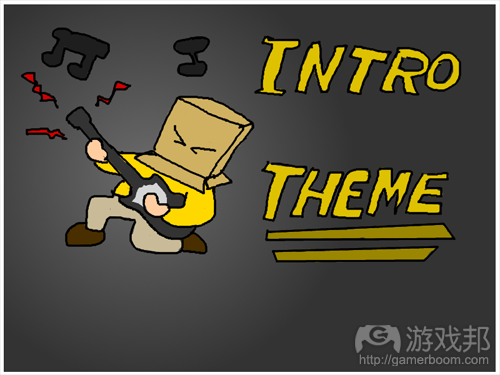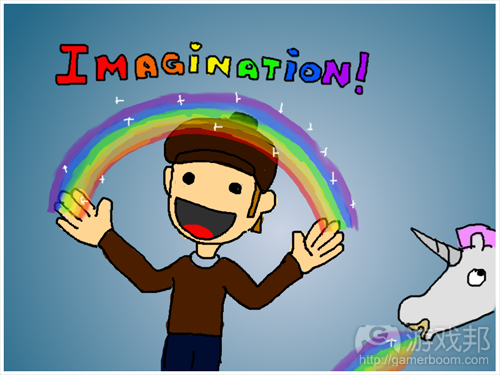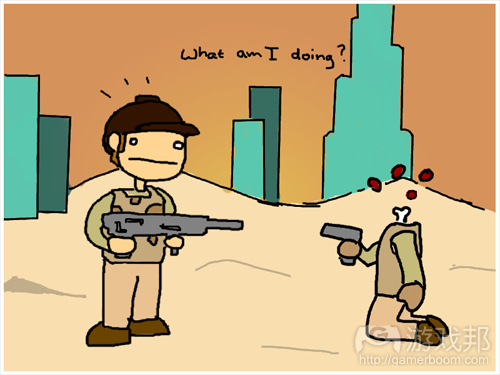阐述主题在游戏设计中的重要性
作者:Adriaan Jansen
我们都曾在观看别人玩游戏时萌生出一个想法,即“这有什么乐趣呢?”就像硬核游戏玩家很难理解足球管理游戏或马术游戏的意义,休闲玩家也不懂《文明》,《使命召唤》或者《星际争霸》的乐趣所在。我们可以将这种差异性归结为个人口味的问题。当然也存在一种能够满足所有类型玩家需求的游戏,但是起决定作用的并非游戏玩法,而应该是游戏主题。主题能够让那些在字面上看来很无聊的游戏瞬间富有生气,如《足球经理人》。所以以下我将明确设计师应该重视游戏主题的一些原因。
孕育在主题中的游戏
对于我来说,主题便是游戏的魅力所在。以下我将列出一些例子进行说明:
《文明》:玩家扮演着世代国家君主。
《黑道圣徒》:玩家扮演着一个普通城市里的无政府主义者。
《邪恶天才》:玩家扮演着像James Bond(游戏邦注:是一套小说和系列电影的主角名称)似的邪恶天才!
《FarmVille》:玩家作为农场社区的一部分,并拥有属于自己的农场。
主题将能够呈现出游戏的感觉,以及游戏最终的发展方向。大多数玩家都不会只因为喜欢游戏玩法而选择游戏,他们更愿意根据主题去选择游戏。这便解释了为何《侠盗猎车手4》作为一款极其出色的游戏却仍然让大多数玩家感到失望的原因。游戏的主题从无政府主义转变到现实主义;而这却不是玩家们所期待的内容。关于主题重要性的另一个论据则是,如果只是面对文本设计,你该如何做才能让玩家继续玩这些看起来不是很有趣的恐怖游戏。让我们以下述内容为例:
*玩家可能需要花费数个小时在游戏中摸索前进,但却会在短短2分钟时间里输掉大半游戏。而游戏也默认玩家不能重新加载之前的游戏。
*为了继续前进玩家可以不做任何思考而四处乱走好几个小时。
*非玩家角色在游戏中扮演着很重要的角色,但是玩家却不能与他们进行直接的互动。
*游戏中不存在明确的目标。
*你在游戏中的主要行动只是行走和打斗,但是这却不可能帮助你获得更多权利和能量。
这些内容听起来都不是很有趣吧?但是像《骑马与砍杀》,这款深受许多玩家喜爱的游戏便突出了中世纪8君主的成长史这一主题,并将上述提到的游戏规则用于强调游戏感。《足球经理人》也是一个典型的例子,即玩家基本上是通过阅读电子表格并观看AI而玩游戏。玩家一直在此寻找能够让自己产生共鸣的主题,并因此去判断哪些属于“糟糕”的游戏。
主题的魔力
一个好的游戏主题有何魔力?主题的魔力主要表现在三个不同但却相互联系的方面:沉浸感,想象力和接受度。不言而喻,一个好的主题自然能够带给玩家更深刻的沉浸感。如果玩家能够辨别游戏中的各种事物,并清楚哪些游戏规则对应哪些环境,那么他们心中的怀疑与不确定感便会大大削弱了。如此游戏才能转变成一个真正的世界,并同时引出了想象力这一元素。
如果玩家能够清楚游戏环境和游戏世界,他们便能够轻松地填补其中的缺口。例如《骑马与砍杀》的缺口便是非玩家角色几乎不会发出任何声音,也缺少生气。当玩家知道自己身处一个中世纪环境中时他们便能够轻松地填补想象缺口。玩家将在游戏中扮演国王和勋爵等角色,所以当他们看到文本内容时便能够想象到他们在谈论些什么。这也是许多老游戏擅长使用的方法,即当游戏中缺少足够的交流空间时。游戏并不需要完整地呈现出主题,但却必须去诱发玩家的想象力并将其融入主题中,而这时候就该由玩家的脑皮层去发挥作用了。在学习曲线中这些小细节也能够发挥重要作用,因为人们总是会对某些特定的内容报以期待。这也是为何许多玩家都能够融入角色中前进的主要原因。
主题的最后一个强大的魔力便是能够推动玩家去接受游戏中各种糟糕的内容。如果游戏主题非常强大,那么这种古怪又无趣的游戏机制便不会有多大影响作用。这时候玩家便能够接受“游戏世界就是如此发展的”这种说法。让我们再次以《骑马与砍杀》为例。游戏中存在各种无聊的游戏机制,如漫无目的地行走并莫名其妙地倒退回之前的过程,而因为强大的主题让这些无聊的机制都能够有效地融入玩家所喜欢的游戏世界中。本来开发者应该创造出更有趣的机制,但是现在即使是糟糕的机制也不会对游戏造成消极影响了。只要能融入主题中,玩家便会选择接受。
利用主题
所以这将如何影响你的游戏设计过程?这得看情况而定了,但是不管怎样我们都必须牢记,主题并不是游戏的唯一推动力,但却是呈现游戏环境的重要工具。让我们以《特殊行动:一线生机》为例,看看这款游戏是如何发挥主题的作用。《特殊行动》拥有两个不同的主题:愚蠢的射手以及PTS综合症。游戏中玩家一直在标准射击与可怕的战争这两大主题间转换着。虽然玩家很容易因为这种环境转换而感到疑惑,但却能够因此基于不同角度去看待游戏。这便赋予了游戏一个全新的含义。所有游戏机制和故事都在突显着这些主题,并推动着它们彼此间的相互作用。从这个例子我们可以看出主题在游戏中的重要作用。
创造一款出色的游戏不一定需要主题(游戏邦注:如《宝石迷阵闪电战》这类型游戏),但是突出主题却能够帮助游戏更贴近用户。进一步了解你的游戏玩法与主题间的关系能够帮助你明确游戏中哪些内容太过古怪,或缺少吸引力,并帮助你创造出接近自己想法的游戏。当游戏设计中开始出现缺口时,你便需要思考哪些游戏机制更适合游戏主题,而不是一味地添加那些只有乐趣的机制。能够与游戏主题和玩法产生共鸣的机制才是好机制。就像在Abbey中我们始终坚持将主题摆在最重要的位置上。每次当我们察觉到某些内容不符合主题设置时,我们便会删除或替换掉它。这就意味着有时候我们将会删除或换掉整个游戏机制。但同时我们也必须留意,主题并不是那般神圣,有些玩家可能根本就不在乎我们选择了怎样的主题。(本文为游戏邦/gamerboom.com编译,拒绝任何不保留版权的转载,如需转载请联系:游戏邦)
Theme is Everything!
by Adriaan Jansen
Ever looked at someone playing a game, and thought:”What could possibly be fun about that?” It could be a game that hardcore gamers seem to have a grudge against, like football managers or a horse game. If you’re more of a casual gamer, you’re more likely to say this about hardcore games like Civilization, Call of Duty or Starcraft. You might put this difference down to a matter of taste. There is a kind game for everyone. This is true, but I think the thing that decides this is not the gameplay, but the theme. Theme can even turn games that look dull and boring on paper into blockbusting powerhouses, like Football Manager. So here are some reasons why you as a designer should absolutely care about theme!
The game is in the theme
To me, the theme is the fantasy your game draws on. To clarify, here are some examples:
Civilization: Being a leader of a nation throughout the ages.
Saint’s Row: Being the ultimate anarchist in a normal city.
Evil Genius: Being a James Bond movie-type evil genius!
Farmville: Be part of a farming community, and owning your own farm.
The theme describes what the game should feel like, and ultimately how the game itself should be. Players mostly don’t pick games based on the sole quality of the gameplay, they pick games based on theme. It explains really well why a lot of gamers were disappointed with GTA 4, even though it’s a great game. The game switched from an anarchist theme to a realistic gritty theme. That’s not what some GTA fans were expecting. Another proof for the importance of theme, is how people can keep playing those horrible games that don’t look much fun if you would just look at the design on paper. Take these things for example:
This game takes hours to make progression, but you can lose half or more of that progression in 2 minutes. By default, you cannot reload to old save games.
You can walk around for hours almost thoughtlessly without doing anything fun in order to make progression.
NPC’s play an important role in this game, but you can’t interact with them on a personal level.
There is no clear goal.
Your most prominent actions are walking and fighting, and both hardly progress in power or possibilities.
Doesn’t sound much like fun does it? It’s Mount & Blade, a game that a lot a players simply loved. The theme of being a medieval lord is just fantastically well brought, and a lot of these gameplay rules described above just put emphasis on what the game should feel like. Football Manager, which is basically reading spreadsheets and watching the AI play the game, is another good example. Player look for themes that resonate with them. You are best defined by what ‘bad’ games you play.
Theme Magic
How does the magic of a good theme work? It mainly works on three different but coherent levels: immersion, imagination and acceptance. It’s almost self evident that a good theme allows for deeper immersion. If a player knows what to identify with, and knows how to put the gameplay rules in a certain context, it will simply help him in maintaining the suspension of disbelief. It allows the game to transform itself into a world. Obvious stuff, right? This is where imagination kicks in!
If a player knows the context and the world, he will easily fill in gaps. An obvious gap in Mount & Blade for example, is that the NPC’s have almost no animation and sound. Chances are not a lot of people cared. The gamers could easily fill that gap since they knew they’re playing in a medieval world. There are human kings and lords, and if they see a text they can imagine them talking. It’s how old games worked too, when there was no room for speech. Games don’t need to give a perfect representation of a theme, but they must spark the imagination of the player into embracing the theme, and let the cortex do all the work. This little detail also helps in the learning curve, since people expect certain things. It’s the reason why a lot of gamers already know that you can walk around with your character.
The last type of magic is another powerful one, namely the acceptance of bad things in your game. If the theme is strong, you can get away with oddities or unfun mechanics more easily. The player can accept that “this is how this world rolls”. Let’s take Mount & Blade as an example again. All those boring mechanics, like walking and losing most of your progression, fit well into the world that the player wants to be in. It could have been made different, it could have been made more fun, but it certainly isn’t hurting the game right now. It fits in theme, and therefor, the player accepts it.
Working with themes
So how should this affect your game design process? It depends, but keep in my mind that theme is not only a boost to your game, but also a powerful communication tool to give context. Since we’re all up in the Spec Ops: The Line craze over here in gamemaking land, let’s take a look at how they used their theme. Spec Ops has two different themes: The ridicule of shooters and PTS Syndrome. During the game it shifts theme between standard shooting and the horrors of war. The switch in context is confusing and confronting to the player, and it forces him to see things in a different perspective. This gives the game a whole new meaning. All mechanics and the narrative reinforce those themes and how they interact with each other. It’s a great example of how theme can make a great difference.
You don’t need theme necessarily to make a great game (see bejeweled), but it certainly helps getting closer to a part of your audience. Taking a closer look at how your gameplay resonates with your theme might give you a clue about which parts of your game are odd or not engaging, and help you to create a game closer to the fantasy you’re trying to create. When holes in the game design start to show up, try to think about mechanics that fit well in the theme rather then just fun mechanics. Judge them carefully, and think of them as incomparable. Mechanics that are resonating with theme and gameplay are always winners. Here at the Abbey we put theme in a central place. Every time something feels odd or off in regard to the theme, we try to remove or replace it. This can even mean that whole mechanics disappear or need to be replaced. Take heed though. Themes are not a holy grail, and some people are impervious to the theme you select.(source:GAMASUTRA)











































 闽公网安备35020302001549号
闽公网安备35020302001549号